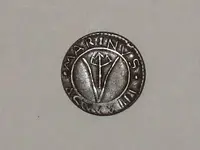Tiberius Claudius Marinus Pacatianus was an usurper in the DanubeThe Danube (Esperanto Danubo, Bulgarian Dunav, German Donau, Greek Ister, Hungarian Duna, Latin Danuvius or Danubius, Romanian Dunăre, Serbian and Croatian Dunav, Slovak Dunaj, Ukrainian Dunay) is the second-longest river in Europe (the Volga being the longest)....
[click for more] area of the Roman EmpireThe Roman Empire is the term conventionally used to describe the Roman state in the centuries following its reorganization under the leadership of Caesar Augustus. Although Rome possessed a collection of tribute-states for centuries before the autocracy of Augustus, the pre-Augustan state is conventionally described as the Roman Republic. The difference between the Roman Empire and the Roman Republic lies primarily in the governing bodies and their relationship to each other. For many years historians made ...
[click for more] during the time of Philip the ArabMarcus Julius Philippus (about 204 - 249), known in English as Philip the Arab, was Roman emperor from 244 to 249. Little is known about Philip's early life and political career. He was born in Damascus in the Roman province of Syria. He was the son of a Julius Marinus, a local Roman citizen, possibly of some importance. The name of his mother is unknown, but sources refer to a brother, Gaius Julius Priscus, a member of the Praetorian guard under Gordian III. Philip married Marcia Otacilia Severa and had a ...
[click for more], ca. 248 Events Cyprian becomes bishop of Carthage. Origen writes an eight-volume work against the pagan writer Celsus. The Roman empire celebrates the 1000th anniversary of the city of Rome with spectacular games organized by Philip the Arab ...
[click for more] AD.
He is known from coins, and from mentions in ZosimusZosimus, Greek historical writer, nourished at Constantinople during the second half of the 5th century A.D. According to Photius, he was a count, and held the office of "advocate" of the imperial treasury. His New History, mainly a compilation from previous authors (Dexippus, Eunapius, Olympiodorus), is in six books: the first sketches briefly the history of the early emperors from Augustus to Diocletian (305); the second, third and fourth deal more fully with the period from the accession of Constantius a...
[click for more] and ZonarasJoannes (John) Zonaras, Byzantine chronicler and theologian, flourished at Constantinople in the 12th century. Under Alexius I Comnenus he held the offices of commander of the bodyguard and private secretary to the emperor, but in the succeeding reign he retired to Hagia Glykeria (one of the Princes' Islands), where he spent the rest of his life in writing books....
[click for more], who say that he was an officer in one of the Danube legions. According to Zosimus, the revolts of Pacatianus in MoesiaIn ancient geography, Moesia was a district inhabited by a Thracian people. It was bounded on the south by the mountain ranges of Haemus and Scardus (Scordus, Scodrus), on the west by the Drinus, on the north by the Danube and on the east by the Euxine. It thus corresponded in the main to the modern Serbia and Bulgaria....
[click for more] (he probably controlled ViminaciumViminacium was the capital of the Roman province of Moesia. (today's Serbia, Bulgaria and Macedonia) It was destroyed during the Barbaric Wars....
[click for more]) and IotapianusM. F. Ru. Iotapianus was an usurper in the eastern provinces of the Roman Empire during the reign of Philip the Arab, around AD 248. He first appears in a rebellion raised against taxation improved by the governor Priscus, who was Philip's brother. The rebellion soon came to an end, and Iotapianus was killed by his own soldiers....
[click for more] in Syria prompted Philip to offer to Senate to step down, but senator DeciusGaius Messius Quintus Trajanus Decius (201-251), Roman emperor (249 - 251), the first of the long succession of distinguished men from the Illyrian provinces, was born at Budalia near Sirmium in lower Pannonia....
[click for more] (who was sent by Philip to deal with the rebellion), correctly predicted that Pacatianus would soon be killed by his own men before his own arrival.








 Maybe you could take it to a coin shop?
Maybe you could take it to a coin shop? 
